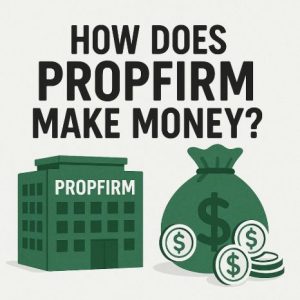Proprietary trading firms don’t manage other people’s money. Instead, they use their own capital and look for skilled traders who can grow it.
Prop firms also give the chance to those who may not have the proper trading capital but able to perform in the markets. Capital is not handed out for free. Traders go through a strict evaluation stage to be shown they are able. This process usually is done by most firms but they charge a fee for it. That is part of their business model.
If the trader passes the evaluation, they are given access to a funded account. The firm then makes money by taking a percentage of the trader’s profits from there. The more successful the trader, the more the firm and the trader make.
Where Prop Firms Make Money
Proprietary firms do not rely on outside investors or clients. Instead, they obtain revenue from internal sources. To develop their business model, these sources merge to create both a sustainable and scalable model.
Profit Share from Funded Traders
The traders are the core of a prop firm’s income. The firm’s capital is given to a trader, and the latter can make profits for himself, and a part of such profits is returned to the firm.
Profits are split between 70 to 90 percent in favour of the trader, as most firms do. This firm retains the rest. It’s a performance-driven model. As the traders do well, the firm makes profits. This arrangement causes the firm and the trader to have an aligned incentive. Both want the same, consistent profitability.
Evaluation or Challenge Fees
To get capital, a trader must prove himself. Normally this is done through an evaluation process or through trading challenge. However, this usually attracts the fees from the most firms.
These fees serve two purposes. First, they help firms cover the cost of screening and infrastructure. Second, they act as a filter. The process will only be completed and committed by a serious, disciplined trader.
A key source of revenue are these one time fees. Even if a trader fails, the firm has already earned from the attempt, while maintaining control of its capital.
Retention and Scaling
More capital is given over time to successful traders. Though accounts scale, prop firms start allowing these accounts to scale only as performance improves. This generates more opportunity for both parties to be profitable.
Some firms even bring plans of scaling up and get a higher profit share, more tools, or fewer fees. Bonus systems secure good traders and render long term profitability for the company.
How Prop Firms Operate as a Business
The firms are not only capital providers. They are run as businesses with structure and systems in place to fuel that growth and expansion. The three foundations of their model are trader selection, risk control, and support systems.
Finding and Funding the Right Traders
The firm begin by attracting talent. By evaluation programs, traders are tested on their discipline, consistency and risk control. Funding goes to those that meet firm’s criteria.
The company does not hand out capital at this point. We are looking for traders that can sustain under structure. Even if remote, these traders are valued into long term assets of the firm.
Built-In Risk Management
Funded traders are monitored under strict guidelines while all trades taken by the funded traders are monitored. Leverage, maximum loss, daily drawdown, and position size has its own rule.
The trader will be funded until he or she breaks these rules. This protects the firm’s capital. It also helps traders to be disciplined.
It is a non negotiable part of the system and that’s risk management. This helps firms stay profitable even in events that not every trader wins.
Education, Platforms, and Support
Many funds go beyond just funding. They invest in their traders. It includes the offers of training, videos, webinars, trade reviews and even a direct mentoring.
They also provide access to reliable platforms, real time data and risk dashboards to firms. These are not benefits, they are tools, which help the trader to perform well and the firm will benefit. The higher the odds of long term success are, the more skilled and prepared the trader is.
Advanced Revenue Strategies
Certain prop firms also trade directly in the markets yet possess their own internal strategies. Together, these activities, along with that which the trader brings in, push the firm’s profit base upward.
Market Making
In some cases, prop firms act as market makers. They are always providing constant buy and sell quotes and are profiting along the spread between them.
The problem with these small profits per trade is that they can grow to big revenues over time. Also, in this case having market making adds liquidity not only to the market, but also is a dual advantage for firms.
Arbitrage
Arbitrage strategies are deployed to exploit a small price difference between two markets. In such cases, firms run bots or algorithms that are going to look for these gaps and execute trades on autopilot.
The strategies typically involve low risk and are scalable. The objective is to capture little but assured profit within each trade.




